Unit2 I think that mooncakes are delicious 重点知识详解加练习(无答案)人教版英语九年级全册
文档属性
| 名称 | Unit2 I think that mooncakes are delicious 重点知识详解加练习(无答案)人教版英语九年级全册 | 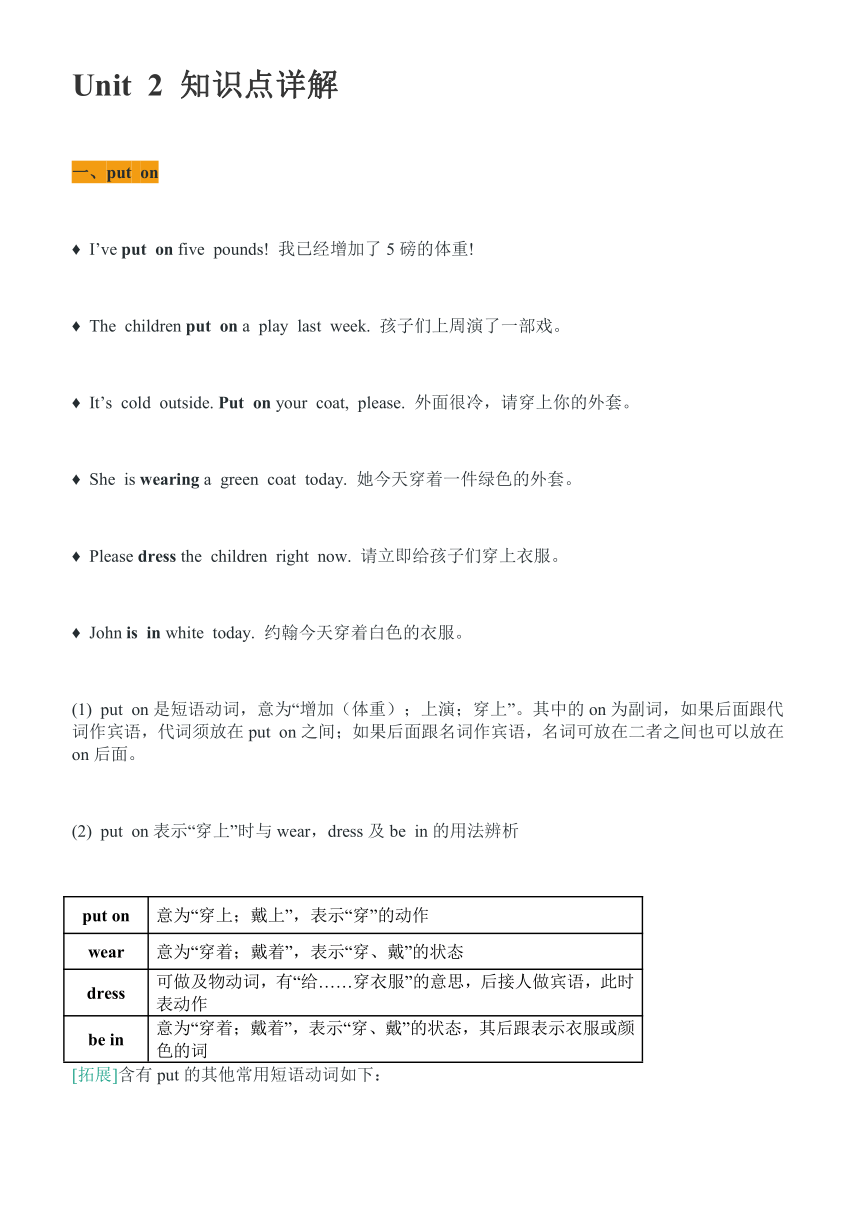 | |
| 格式 | docx | ||
| 文件大小 | 57.0KB | ||
| 资源类型 | 教案 | ||
| 版本资源 | 人教新目标(Go for it)版 | ||
| 科目 | 英语 | ||
| 更新时间 | 2024-11-07 16:15:41 | ||
图片预览

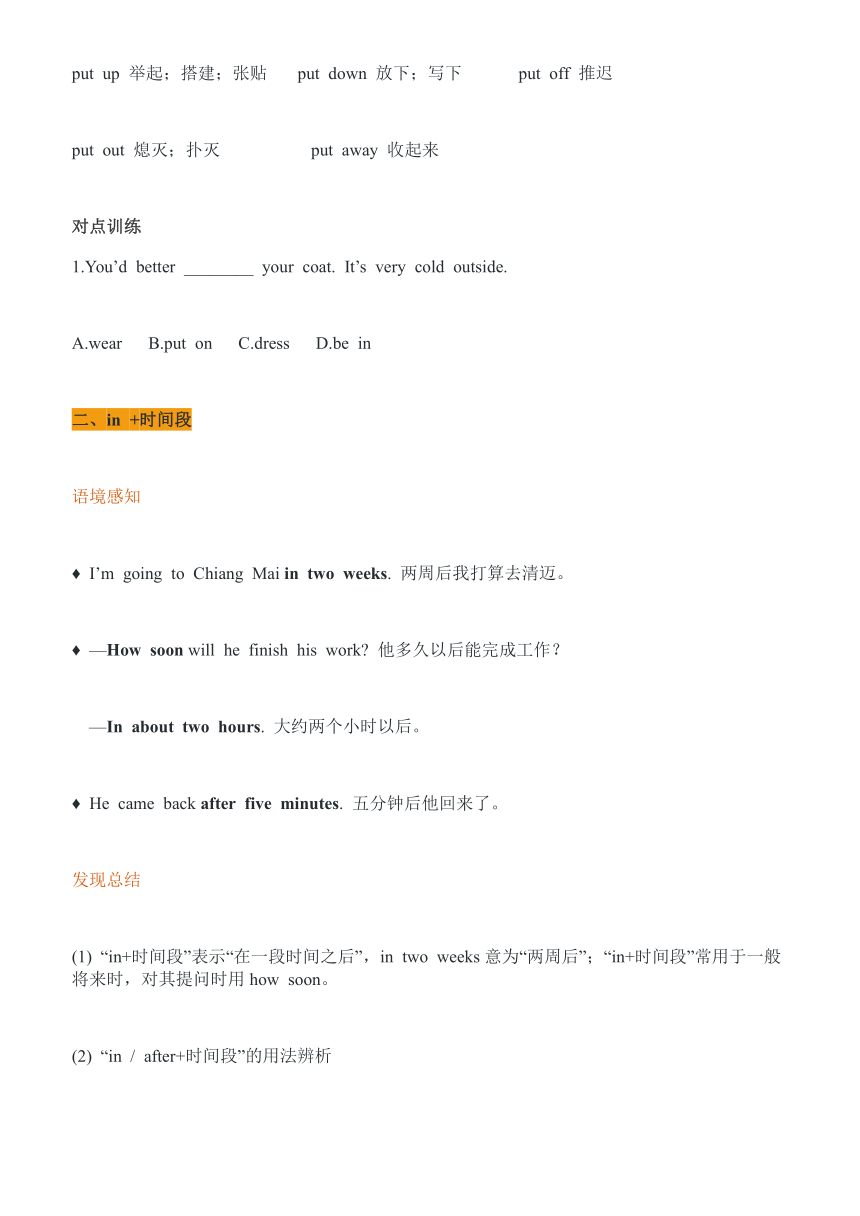
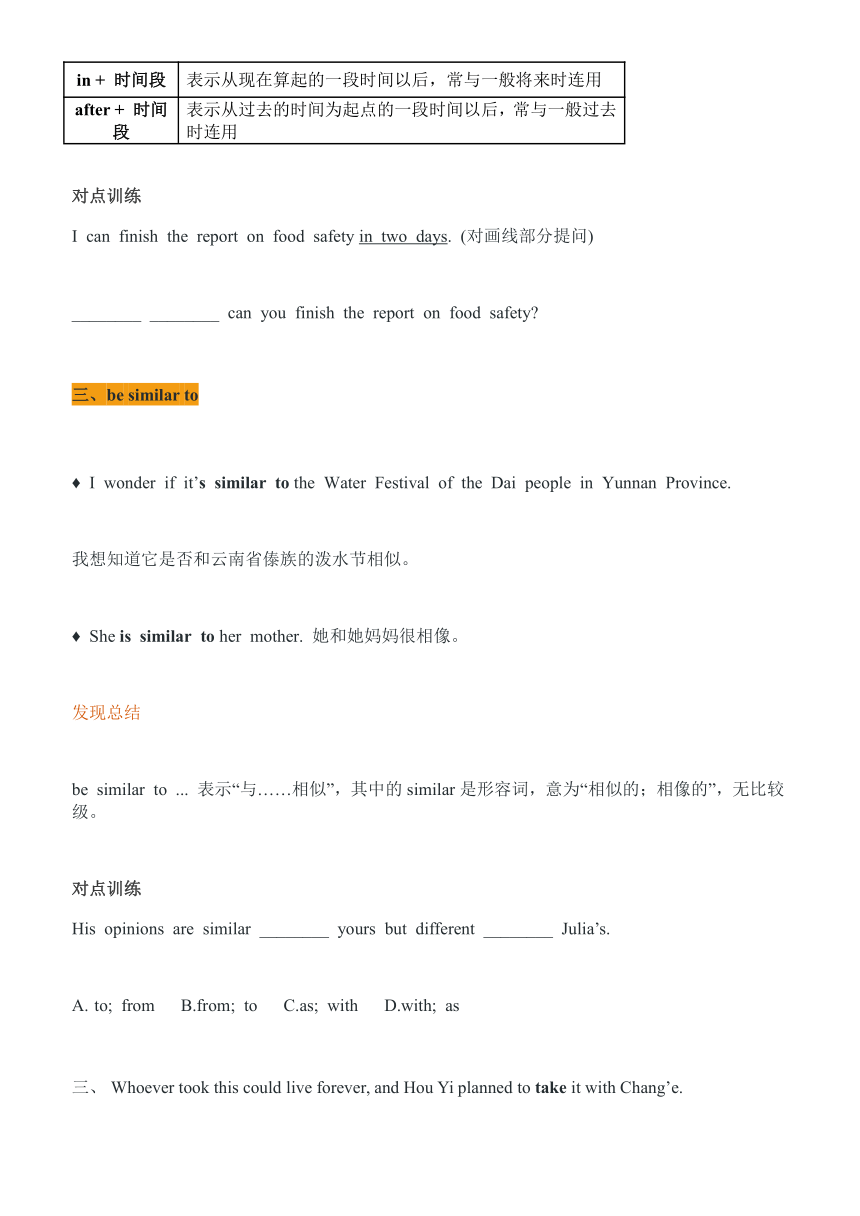
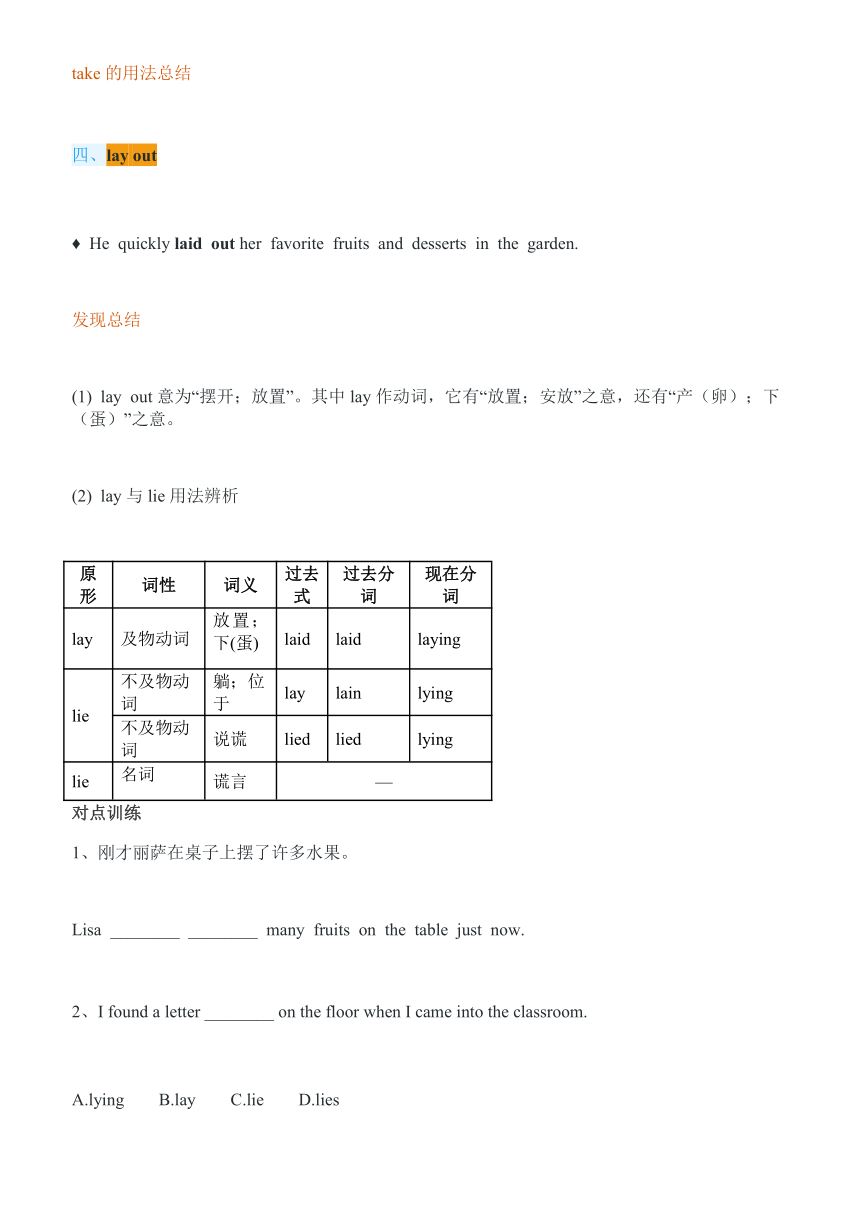
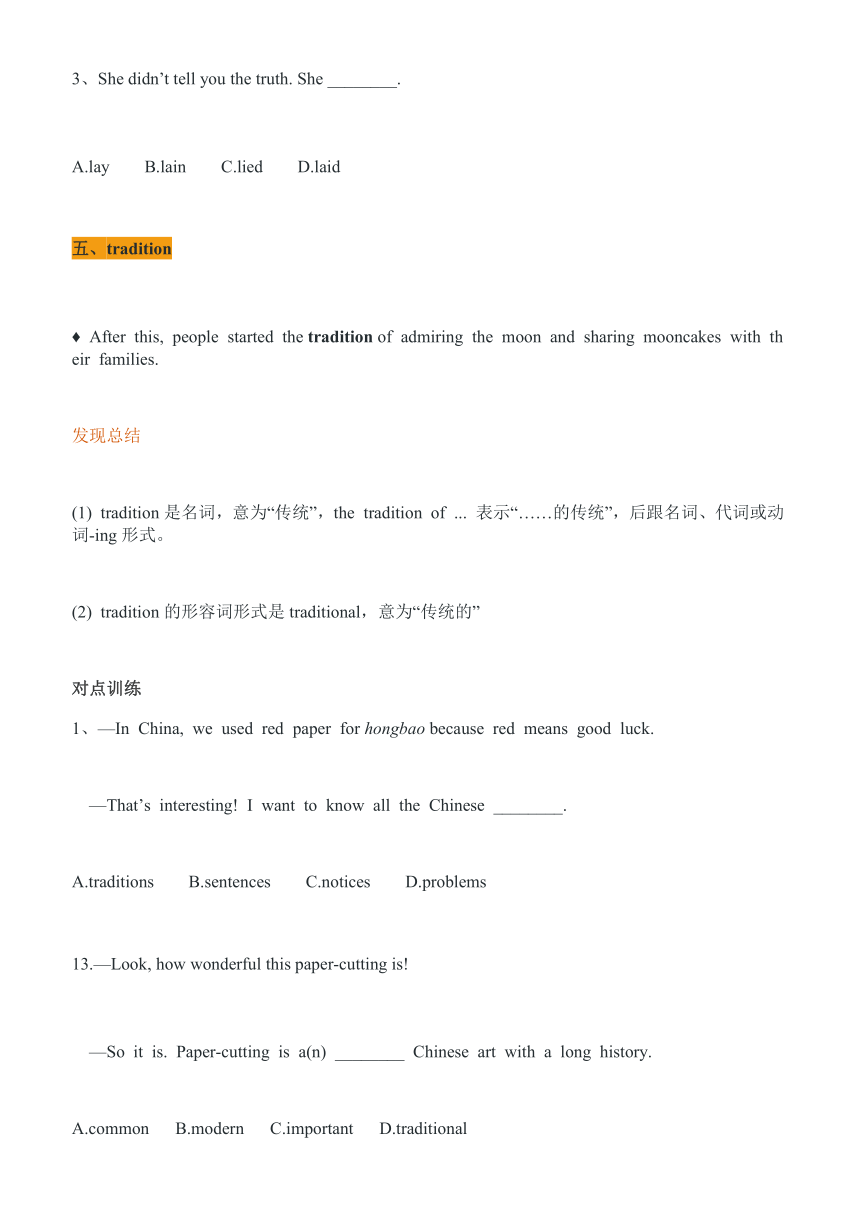
文档简介
Unit 2 知识点详解
一、put on
I’ve put on five pounds! 我已经增加了5磅的体重!
The children put on a play last week. 孩子们上周演了一部戏。
It’s cold outside. Put on your coat, please. 外面很冷,请穿上你的外套。
She is wearing a green coat today. 她今天穿着一件绿色的外套。
Please dress the children right now. 请立即给孩子们穿上衣服。
John is in white today. 约翰今天穿着白色的衣服。
(1) put on是短语动词,意为“增加(体重);上演;穿上”。其中的on为副词,如果后面跟代词作宾语,代词须放在put on之间;如果后面跟名词作宾语,名词可放在二者之间也可以放在on后面。
(2) put on表示“穿上”时与wear,dress及be in的用法辨析
put on 意为“穿上;戴上”,表示“穿”的动作
wear 意为“穿着;戴着”,表示“穿、戴”的状态
dress 可做及物动词,有“给……穿衣服”的意思,后接人做宾语,此时表动作
be in 意为“穿着;戴着”,表示“穿、戴”的状态,其后跟表示衣服或颜色的词
[拓展]含有put的其他常用短语动词如下:
put up 举起;搭建;张贴 put down 放下;写下 put off 推迟
put out 熄灭;扑灭 put away 收起来
对点训练
1.You’d better ________ your coat. It’s very cold outside.
A.wear B.put on C.dress D.be in
二、in +时间段
语境感知
I’m going to Chiang Mai in two weeks. 两周后我打算去清迈。
—How soon will he finish his work 他多久以后能完成工作?
—In about two hours. 大约两个小时以后。
He came back after five minutes. 五分钟后他回来了。
发现总结
(1) “in+时间段”表示“在一段时间之后”,in two weeks意为“两周后”;“in+时间段”常用于一般将来时,对其提问时用how soon。
(2) “in / after+时间段”的用法辨析
in + 时间段 表示从现在算起的一段时间以后,常与一般将来时连用
after + 时间段 表示从过去的时间为起点的一段时间以后,常与一般过去时连用
对点训练
I can finish the report on food safety in two days. (对画线部分提问)
________ ________ can you finish the report on food safety
三、be similar to
I wonder if it’s similar to the Water Festival of the Dai people in Yunnan Province.
我想知道它是否和云南省傣族的泼水节相似。
She is similar to her mother. 她和她妈妈很相像。
发现总结
be similar to ... 表示“与……相似”,其中的similar是形容词,意为“相似的;相像的”,无比较级。
对点训练
His opinions are similar ________ yours but different ________ Julia’s.
to; from B.from; to C.as; with D.with; as
三、 Whoever took this could live forever, and Hou Yi planned to take it with Chang’e.
take的用法总结
四、lay out
He quickly laid out her favorite fruits and desserts in the garden.
发现总结
(1) lay out意为“摆开;放置”。其中lay作动词,它有“放置;安放”之意,还有“产(卵);下(蛋)”之意。
(2) lay与lie用法辨析
原形 词性 词义 过去式 过去分词 现在分词
lay 及物动词 放置;下(蛋) laid laid laying
lie 不及物动词 躺;位于 lay lain lying
不及物动词 说谎 lied lied lying
lie 名词 谎言 —
对点训练
1、刚才丽萨在桌子上摆了许多水果。
Lisa ________ ________ many fruits on the table just now.
2、I found a letter ________ on the floor when I came into the classroom.
A.lying B.lay C.lie D.lies
3、She didn’t tell you the truth. She ________.
A.lay B.lain C.lied D.laid
五、tradition
After this, people started the tradition of admiring the moon and sharing mooncakes with their families.
发现总结
(1) tradition是名词,意为“传统”,the tradition of ... 表示“……的传统”,后跟名词、代词或动词-ing形式。
(2) tradition的形容词形式是traditional,意为“传统的”
对点训练
1、—In China, we used red paper for hongbao because red means good luck.
—That’s interesting! I want to know all the Chinese ________.
A.traditions B.sentences C.notices D.problems
13.—Look, how wonderful this paper-cutting is!
—So it is. Paper-cutting is a(n) ________ Chinese art with a long history.
A.common B.modern C.important D.traditional
六、admire
They admired our garden. 他们欣赏我们的花园。
I admire him for his success in business. 我钦佩他事业有成。
发现总结
admire为及物动词,意为“欣赏;仰慕”。常用结构有:admire sb. / sth.“欣赏某人/某事”;
admire sb. for (doing) sth.“因(做)某事钦佩某人” 。
对点训练
1、He caught the thief by himself on the bus. All of us ________ him for his courage.
A.admired B.enjoyed C.imagined D.expected
2、We all admire the professor ________ his intelligence and kindness.
A.of B.with C.for D.at
七、spend
I spent three hours (in) reading the novel. 我花了三个小时读这篇小说。
I spent 100 yuan on the sweater. 我花了100元买这件毛衣。
发现总结
(1) spend意为“花费”,其后的宾语为时间/金钱,宾语后可跟on sth,也可跟动词-ing形式。
(2) spend, pay, cost与take表示“花费”时的常用句型
词汇 主语 句型结构
spend 人 sb. spend(s) some time/money (in) doing sth.
sb. spend(s) some time/money on sth. Sb.spend(s) some time with sb.
pay 人 sb. pay(s) some money for sth.
cost 物 sth. cost(s) sb. some money.
take it It takes/took sb. some time to do sth.
对点训练
1、—Mom, look at all the clothes I bought online.
—Again You shouldn’t spend so much money ________ clothes.
A.in B.for C.on D.with
18.He ________ most of his time ________ English.
A.spends; studying B.cost; studied C.takes; to study D.pays; studies
八、dead
One Christmas Eve, Scrooge sees the ghost of Jacob Marley, his dead business partner.
一个圣诞节的前夜,斯克鲁奇见到了他死去的商业伙伴雅各布·马利的鬼魂。
My grandfather’s dead. He died in 2001. 我爷爷不在了。他是2001年去世的。
His death made me very sad. 他的离世让我非常难过。
She would cry for a dying cat before. 以前,她会为一只快死的猫哭泣。
发现总结
dead, die, dying与death的用法辨析
dead 形容词 常与be动词连用,表示死亡的状态,可与一段时间连用,表示死亡多长时间
die 动词 意为“死;死亡”,指生命的结束,强调动作,是瞬间动词,不能与一段时间连用
dying 形容词 意为“奄奄一息;垂死的”,一般用作定语
death 名词 意为“死亡”
对点训练
1、William Shakespeare _______ for 400 years, but his works still have great influence today.
A.died B.was dying C.has died D.has been dead
2、The man was ________. He ________ of hunger. We’re sorry about his ________.
A.dead; death; die B.death; dead; died
C.dead; died; death D.died; dead; death
九、warn
He warns Scrooge to change his ways if he doesn’t want to end up like him.
他告诫斯克鲁奇,如果他不想最终像他那样的话,就改变他(为人处世)的方式。
The police warned us not to go out at night. 警察告诫我们晚上不要出门。
发现总结
(1) warn sb. (not) to do sth. 警告/告诫某人(不要)做某事
对点训练
1、The policeman warned the man ________ after drinking.
A.not to drive B.to drive C.drinking D.doesn’t drink
2、Mother often warns his child ________ ( play) in the safe place.
十、end up
We didn’t like it at first, but we ended up cheering.
一开始我们并不喜欢它,可最后我们为之欢呼起来。
发现总结
end up意为“最终成为;最后处于”,其后可接动词-ing形式、介词短语等。
对点训练
9.—Mom told me to make a clear list before going shopping.
—She was right. Or you might ________ picking up many unnecessary things.
A.look up B.take up C.set up D.end up
10.After working her way around the world, Annie ended up ________ English as a foreign language teacher.
A.teach B.taught C.teaching D.to teach
十一、expect
I expect a letter from my family. 我期待一封家信。
She expects to come back next week. 她期待下个星期回来。
I didn’t expect him to become a successful writer. 我没想到他会成为一个成功的作家。
I expect that I will get good grades this term. 我期望这学期我会取得好成绩。
发现总结
expect用作动词,意为“期待;预料”,后接名词、代词、动词不定式或从句,其常用结构为:
对点训练
1、Teachers expect all their students ________ progress day by day.
A.to make B.make C.making D.made
12.You can’t expect ________ (learn) a foreign language in a few months.
十二、promise
He promised to help me. 他答应要帮助我。
I promise not to be late again. 我保证不再迟到。
I promise you not to say that. 我答应你不说那件事。
She promised that she would write to me. 她承诺会给我写信。
发现总结
promise作动词,意为“允诺;答应”,其常用结构有:
(2) promise (not) to do sth. 承诺/答应(不)做某事
(3) promise sb. (not) to do sth. 承诺/答应某人(不)做某事
(4) promise + that从句 承诺……
[拓展] promise用作可数名词,意为“承诺;诺言”。常用短语:make/keep/break a promise,意为“许下/遵守/违背诺言”。
对点训练
15.—Tom, let’s hang out after school.
—Sorry, I have ________ Frank to work on the biology report with him.
A.advised B.expected C.promised D.warned
16.The boy has promised ________ (not play) computer games again.
一、put on
I’ve put on five pounds! 我已经增加了5磅的体重!
The children put on a play last week. 孩子们上周演了一部戏。
It’s cold outside. Put on your coat, please. 外面很冷,请穿上你的外套。
She is wearing a green coat today. 她今天穿着一件绿色的外套。
Please dress the children right now. 请立即给孩子们穿上衣服。
John is in white today. 约翰今天穿着白色的衣服。
(1) put on是短语动词,意为“增加(体重);上演;穿上”。其中的on为副词,如果后面跟代词作宾语,代词须放在put on之间;如果后面跟名词作宾语,名词可放在二者之间也可以放在on后面。
(2) put on表示“穿上”时与wear,dress及be in的用法辨析
put on 意为“穿上;戴上”,表示“穿”的动作
wear 意为“穿着;戴着”,表示“穿、戴”的状态
dress 可做及物动词,有“给……穿衣服”的意思,后接人做宾语,此时表动作
be in 意为“穿着;戴着”,表示“穿、戴”的状态,其后跟表示衣服或颜色的词
[拓展]含有put的其他常用短语动词如下:
put up 举起;搭建;张贴 put down 放下;写下 put off 推迟
put out 熄灭;扑灭 put away 收起来
对点训练
1.You’d better ________ your coat. It’s very cold outside.
A.wear B.put on C.dress D.be in
二、in +时间段
语境感知
I’m going to Chiang Mai in two weeks. 两周后我打算去清迈。
—How soon will he finish his work 他多久以后能完成工作?
—In about two hours. 大约两个小时以后。
He came back after five minutes. 五分钟后他回来了。
发现总结
(1) “in+时间段”表示“在一段时间之后”,in two weeks意为“两周后”;“in+时间段”常用于一般将来时,对其提问时用how soon。
(2) “in / after+时间段”的用法辨析
in + 时间段 表示从现在算起的一段时间以后,常与一般将来时连用
after + 时间段 表示从过去的时间为起点的一段时间以后,常与一般过去时连用
对点训练
I can finish the report on food safety in two days. (对画线部分提问)
________ ________ can you finish the report on food safety
三、be similar to
I wonder if it’s similar to the Water Festival of the Dai people in Yunnan Province.
我想知道它是否和云南省傣族的泼水节相似。
She is similar to her mother. 她和她妈妈很相像。
发现总结
be similar to ... 表示“与……相似”,其中的similar是形容词,意为“相似的;相像的”,无比较级。
对点训练
His opinions are similar ________ yours but different ________ Julia’s.
to; from B.from; to C.as; with D.with; as
三、 Whoever took this could live forever, and Hou Yi planned to take it with Chang’e.
take的用法总结
四、lay out
He quickly laid out her favorite fruits and desserts in the garden.
发现总结
(1) lay out意为“摆开;放置”。其中lay作动词,它有“放置;安放”之意,还有“产(卵);下(蛋)”之意。
(2) lay与lie用法辨析
原形 词性 词义 过去式 过去分词 现在分词
lay 及物动词 放置;下(蛋) laid laid laying
lie 不及物动词 躺;位于 lay lain lying
不及物动词 说谎 lied lied lying
lie 名词 谎言 —
对点训练
1、刚才丽萨在桌子上摆了许多水果。
Lisa ________ ________ many fruits on the table just now.
2、I found a letter ________ on the floor when I came into the classroom.
A.lying B.lay C.lie D.lies
3、She didn’t tell you the truth. She ________.
A.lay B.lain C.lied D.laid
五、tradition
After this, people started the tradition of admiring the moon and sharing mooncakes with their families.
发现总结
(1) tradition是名词,意为“传统”,the tradition of ... 表示“……的传统”,后跟名词、代词或动词-ing形式。
(2) tradition的形容词形式是traditional,意为“传统的”
对点训练
1、—In China, we used red paper for hongbao because red means good luck.
—That’s interesting! I want to know all the Chinese ________.
A.traditions B.sentences C.notices D.problems
13.—Look, how wonderful this paper-cutting is!
—So it is. Paper-cutting is a(n) ________ Chinese art with a long history.
A.common B.modern C.important D.traditional
六、admire
They admired our garden. 他们欣赏我们的花园。
I admire him for his success in business. 我钦佩他事业有成。
发现总结
admire为及物动词,意为“欣赏;仰慕”。常用结构有:admire sb. / sth.“欣赏某人/某事”;
admire sb. for (doing) sth.“因(做)某事钦佩某人” 。
对点训练
1、He caught the thief by himself on the bus. All of us ________ him for his courage.
A.admired B.enjoyed C.imagined D.expected
2、We all admire the professor ________ his intelligence and kindness.
A.of B.with C.for D.at
七、spend
I spent three hours (in) reading the novel. 我花了三个小时读这篇小说。
I spent 100 yuan on the sweater. 我花了100元买这件毛衣。
发现总结
(1) spend意为“花费”,其后的宾语为时间/金钱,宾语后可跟on sth,也可跟动词-ing形式。
(2) spend, pay, cost与take表示“花费”时的常用句型
词汇 主语 句型结构
spend 人 sb. spend(s) some time/money (in) doing sth.
sb. spend(s) some time/money on sth. Sb.spend(s) some time with sb.
pay 人 sb. pay(s) some money for sth.
cost 物 sth. cost(s) sb. some money.
take it It takes/took sb. some time to do sth.
对点训练
1、—Mom, look at all the clothes I bought online.
—Again You shouldn’t spend so much money ________ clothes.
A.in B.for C.on D.with
18.He ________ most of his time ________ English.
A.spends; studying B.cost; studied C.takes; to study D.pays; studies
八、dead
One Christmas Eve, Scrooge sees the ghost of Jacob Marley, his dead business partner.
一个圣诞节的前夜,斯克鲁奇见到了他死去的商业伙伴雅各布·马利的鬼魂。
My grandfather’s dead. He died in 2001. 我爷爷不在了。他是2001年去世的。
His death made me very sad. 他的离世让我非常难过。
She would cry for a dying cat before. 以前,她会为一只快死的猫哭泣。
发现总结
dead, die, dying与death的用法辨析
dead 形容词 常与be动词连用,表示死亡的状态,可与一段时间连用,表示死亡多长时间
die 动词 意为“死;死亡”,指生命的结束,强调动作,是瞬间动词,不能与一段时间连用
dying 形容词 意为“奄奄一息;垂死的”,一般用作定语
death 名词 意为“死亡”
对点训练
1、William Shakespeare _______ for 400 years, but his works still have great influence today.
A.died B.was dying C.has died D.has been dead
2、The man was ________. He ________ of hunger. We’re sorry about his ________.
A.dead; death; die B.death; dead; died
C.dead; died; death D.died; dead; death
九、warn
He warns Scrooge to change his ways if he doesn’t want to end up like him.
他告诫斯克鲁奇,如果他不想最终像他那样的话,就改变他(为人处世)的方式。
The police warned us not to go out at night. 警察告诫我们晚上不要出门。
发现总结
(1) warn sb. (not) to do sth. 警告/告诫某人(不要)做某事
对点训练
1、The policeman warned the man ________ after drinking.
A.not to drive B.to drive C.drinking D.doesn’t drink
2、Mother often warns his child ________ ( play) in the safe place.
十、end up
We didn’t like it at first, but we ended up cheering.
一开始我们并不喜欢它,可最后我们为之欢呼起来。
发现总结
end up意为“最终成为;最后处于”,其后可接动词-ing形式、介词短语等。
对点训练
9.—Mom told me to make a clear list before going shopping.
—She was right. Or you might ________ picking up many unnecessary things.
A.look up B.take up C.set up D.end up
10.After working her way around the world, Annie ended up ________ English as a foreign language teacher.
A.teach B.taught C.teaching D.to teach
十一、expect
I expect a letter from my family. 我期待一封家信。
She expects to come back next week. 她期待下个星期回来。
I didn’t expect him to become a successful writer. 我没想到他会成为一个成功的作家。
I expect that I will get good grades this term. 我期望这学期我会取得好成绩。
发现总结
expect用作动词,意为“期待;预料”,后接名词、代词、动词不定式或从句,其常用结构为:
对点训练
1、Teachers expect all their students ________ progress day by day.
A.to make B.make C.making D.made
12.You can’t expect ________ (learn) a foreign language in a few months.
十二、promise
He promised to help me. 他答应要帮助我。
I promise not to be late again. 我保证不再迟到。
I promise you not to say that. 我答应你不说那件事。
She promised that she would write to me. 她承诺会给我写信。
发现总结
promise作动词,意为“允诺;答应”,其常用结构有:
(2) promise (not) to do sth. 承诺/答应(不)做某事
(3) promise sb. (not) to do sth. 承诺/答应某人(不)做某事
(4) promise + that从句 承诺……
[拓展] promise用作可数名词,意为“承诺;诺言”。常用短语:make/keep/break a promise,意为“许下/遵守/违背诺言”。
对点训练
15.—Tom, let’s hang out after school.
—Sorry, I have ________ Frank to work on the biology report with him.
A.advised B.expected C.promised D.warned
16.The boy has promised ________ (not play) computer games again.
同课章节目录
- Unit 1 How can we become good learners.
- Section A
- Section B
- Unit 2 I think that mooncakes are delicious!
- Section A
- Section B
- Unit 3 Could you please tell me where the restroom
- Section A
- Section B
- Unit 4 I used to be afraid of the dark.
- Section A
- Section B
- Unit 5 What are the shirts made of?
- Section A
- Section B
- Review of Units 1-5
- Unit 6 When was it invented?
- Section A
- Section B
- Unit 7 Teenagers should be allowed to choose their
- Section A
- Section B
- Unit 8 It must belong to Carla.
- Section A
- Section B
- Unit 9 I like music that I can dance to.
- Section A
- Section B
- Unit 10 You're supposed to shake hands.
- Section A
- Section B
- Review of Units 6-10
- Unit 11 Sad movies make me cry.
- Section A
- Section B
- Unit 12 Life is full of the unexpected
- Section A
- Section B
- Unit 13 We're trying to save the earth!
- Section A
- Section B
- Unit 14 I remember meeting all of you in Grade 7.
- Section A
- Section B
- Review of Units 11-14
